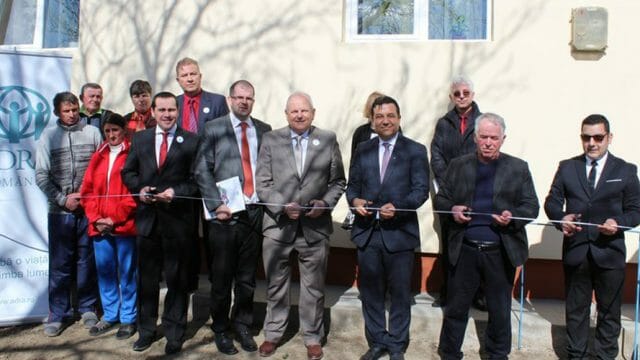The Christian approach

Please! Do not let us be victims of another genocide. Get us out of here!”
Sheik Munir, the Yazidi community leader at the Petra Olympus refugee camp near the foothill of Mount Olympus in Greece, fervently urged local officials for help. Winter was approaching, and the site that had served as a refugee camp since spring provided only fragile tents unable to protect residents from the cold and the snow, which already had capped the mountains.
About 1,200 people, including 500 children, had been waiting eight months to find a way to join their families in Germany.
“My people have gone through more than 70 genocides,” Munir continued. “Last year we lived through another one in Iraq. It was horrible. As horrible as it was for us to travel by sea. Do not let us die here!”
With political and military instability in the Middle East and North Africa, and drought and famine in Africa’s Sahel region, approximately 1.5 million people risked their lives in 2015 and 2016 to flee to Europe in search of safety and stability. They were forced to leave everything behind. They attempted to relocate in unfamiliar lands, which were often unfriendly to them.
Europeans have now become attentive to refugee issues. For some, this is out of sympathy; others, however, fear their culture and way of life are being threatened.
The Reality of Numbers
Statistics from the United Nations High Commissioner for Refugees (UNHCR)1 indicate that the number of people forced to flee their homes as a result of persecution, conflict, violence, or human rights violations has risen dramatically since the Second World War. In 2017, 68.5 million people worldwide fled their homes, more than the entire population of France. Of these, 25.4 million are refugees, more than half of whom are under the age of 18. The largest slice, 40 million people, are internally displaced persons (IDPs), meaning people who did not leave their country but had to move to a different region.
Three countries of origin contribute to almost half of the total number of refugees: Syria—6.3 million; Afghanistan—2.6 million; and South Sudan—2.4 million.
About 85 percent of refugees are living in developing countries, with Turkey in the lead with 3.5 million people. When we look at the number of refugees in proportion to the number of people in the host country, the most generous nation is Lebanon. With a population of 6 million, Lebanon is hosting
1 million refugees. Comparatively, all of Europe, excluding Turkey but including all countries outside of the European Union, has a total population of 741 million people and is hosting 2.4 million refugees.
Religious Persecution
According to the United Nations, the term refugee applies to any person who “owing to well-founded fear of being persecuted for reasons of race, religion, nationality, membership of a particular social group or political opinion, is outside the country of his nationality and is unable or, owing to such fear, is unwilling to avail himself of the protection of that country; or who, not having a nationality and being outside the country of his former habitual residence as a result of such events, is unable or, owing to such fear, is unwilling to return to it.”2
Religious persecution is one of the most prevalent reasons people flee their homelands. Religion, however, is often presented as a destabilizing factor for the host communities rather than a cause for refugee status.
Most refugees are forced to leave because of armed conflicts. These conflicts, however, are often underscored by religious reasons and the lack of freedom of conscience. The conflicts in Syria, Afghanistan, and South Sudan—and more recently the Rohingya crisis in Myanmar—have a deep religious foundation.
The example of the Yazidis cited earlier is a prime example of this situation. For centuries they have been persecuted and were victims of genocides because they hold different religious principles.
A Threatened Europe?
Instead of being seen as a cause of persecution, a refugee’s religion has long been viewed by many in Europe as a threat to the continent’s traditional Judeo-Christian matrix. Their fear is an invasion of different religions, customs, and cultures. The religious way of life of some refugees does indeed often clash with the traditions and habits of the hosting countries, so challenges arise.
Peacemakers
So what is the role of Christ’s followers when confronted with these circumstances? In Matthew 5:9 Jesus calls us to be peacemakers. Christians are to exercise this character trait when faced with the arrival of refugees within their borders, even if the refugees profess creeds different from their own.
But more than tolerating one another’s creeds, we need to develop a spirit of solidarity that supports and advocates minority groups that have little or no social support. The Word of God is clear: “Speak up for those who cannot speak for themselves, for the rights of all who are destitute” (Prov. 31:8).3
Communities receiving refugees should build bridges that encourage the learning of local languages and customs. Effective integration promotes peace and tolerance, and may allow access to the labor market. The order given to the people of Israel when they established their nation also serves us today: “You are to love those who are foreigners, for you yourselves were foreigners in Egypt” (Deut. 10:19).
Presently Europe has a unique opportunity to demonstrate tolerance, solidarity, and respect for human dignity. As Christians we have an additional responsibility to demonstrate God’s love through acts of kindness and respect for those who have had to leave behind everything they own, searching for peace, security, and comfort for themselves and their families.
Sheik Munir and his people did not spend the winter below Mount Olympus. By working collaboratively, ADRA, the United Nations, and the Greek government relocated the refugees. In time they received asylum in other European countries, eventually joining their families in Germany, where as a people they have found the peace and security they sought.
Fortunately for this community, Europe knew how to live up to its Christian foundations.
To view a video of ADRA’s refugee work in Belgrade, go to adra.org.rs/?lang=en.
1 www.unhcr.org/figures-at-a-glance.html
2 Article 1 (A) (2) of the 1951 Convention Relating to the Status of Refugees, www.refugeelegalaidinformation.org/1951-convention.
3 All Bible texts are taken from the Holy Bible, New International Version. Copyright © 1973, 1978, 1984, 2011 by Biblica, Inc. Used by permission. All rights reserved worldwide.








